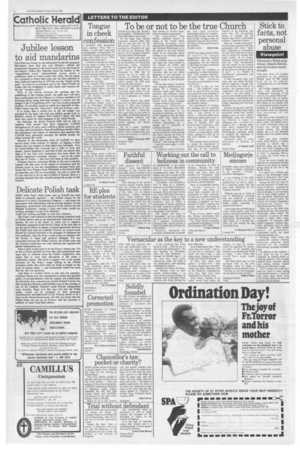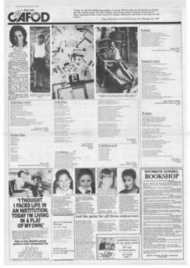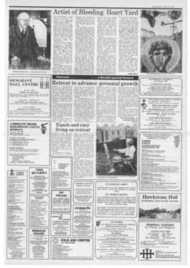Page 4, 12th June 1987
Page 4

Report an error
Noticed an error on this page?If you've noticed an error in this article please click here to report it.
Tags
Share
Related articles
Willebrand's Us Talks Rekindles Controversy
The Church In Action
Fierce Bulldogs (chaps, I Mean, In The Oxford Sense) Who
Cardinal Hinsley Receives Honorary Degree Of Doctor Of...
The Dominicans Champions Of Humanity
To be or not to be the true Church
YOUR issue (May 29), carried a first headline: "Willebrand's US Talks Rekindles Controversy."
At the same time Oxford University Gazette (May 28), tells us that the first of the Honorary Degrees to be conferred at Encaenia on June 24 will be an Honorary DD, given to H E Cardinal Johannes Gerardus Maria Willebrands.
May I remark upon this, and its importance. His predecessor at the Secretariat for Promoting Christian Unity, Cardinal Augustin Bea SJ, was offered just such an Honorary Doctorate in 1968. But he proved too ill to make the journey to Oxford, and the matter was dropped (alas, out of public record). He died soon afterwards that autumn.
Only one Cardinal, Fr Basil Hume in 1981, has been so honoured. Franz Ehrle SJ was made Hon DCL and later raised to the Cardinalate as Vatican Archivist.
Cardinal Bourne was made Hon DCL in 1922; and Cardinal Seredi in 1936; and Cardinal Hinsley in 1942. But this is "one below" Hon DD — which has been given only to one other in the 1980s, Archbishop Runcie in 1980. (Indeed Cantuar and Westminster were meant to receive together, but diaries interposed).
So, In a sense, Cardinal Willebrands comes to collect for SPCU what Cardinal Bea was too ill ever to receive. It will be a moving moment.
Alberic Stacpoole OSB St Benet's Hall, Oxford find reasons to involve themselves in pointless arguments?
The "controversy" that Martin Newland reports as raging in the United States regarding divergent views expressed by Cardinal Ratzinger and Cardinal Willebrands as to the nature of the true Church seems to be much-ado about nothing to an ordinary layman such as myself.
No Catholic has ever denied that there are "gifts proper to the Church of Christ and therefore true ecclesial elements" in those Christian Churches that do not admit allegiance to the Successor of Peter. No doubt those gifts can also be found in non-Christian faiths.
On the other hand it would be sheer religious indifferentism to suggest for a moment that Churches which teach different doctrines and different moral tenets can all be full and equal members of the Universal Church which Christ founded "to bear witness to the Truth".
Whataever differences Cardinal Willebrands has with Cardinal Ratzinger as to theological semantics, no one is surely suggesting that he holds that view? One would even doubt that the American Catholic theologians do — though one is surprised at nothing these days.
Let us remember only that our Saviour prayed for Unity among His flock, leaving the Keys of the Kingdom with Peter, "the Rock upon which I build my Church", and leaving the flock — until He comes again — to be fed by him.
To whatever extent it is true to say that other Christian communities share our membership of His Church, they do not share it fully, so long as they are separated from the See of Peter, the Vicar of Christ and Prince of the Apostles.
Chorley, Lancs. John Evans YOUR front page article of May 29 reports an alleged disagreement between Cardinal Willebrands and the Sacred Congregation for the Doctrine of the Faith on what constitutes the "true Church."
You quote the Cardinal as recognizing in other denominations "true ecclesial elements" and your comment is that this confirms that "mainline Churches are all members of the true Church."
Of course it does no such thing — the Cardinal's statement as reported does no more than repeat the clear teaching of the Decree on the Church, that "ecclesial elements" only exist outside the visible structure of the Catholic Church.
The contribution of Vatican II's teaching was to substitute for concepts of sheer black and white — True Church or no church — with one which more realistically admits grey tones. It sees Churches that admit so much of Catholic faith and practice that it produces a new term to describe them — "ecclesial" (of the nature of the Church) to a high degree, while others, perhaps we may say all that have baptism, to a lesser degree.
The conciliar decree continues to extend the description of People of God (a wider concept than that of the structured Church) to all believing and good men. The pre-conciliar system of thought did not dismiss them either; it attributed to them a "baptism of desire."
That the "visibly structured"
Church (what jargon!) went into partnership with other "main line" Churches as co-members of some True Church inc can be seen as absurd by anyone who reads section 14 of Lumen Gentium. which insists that they only are "fully incorporated into the society of the Church who accept her entire system and all the means of salvation given to her" — in "bonds of ecclesiastical government and communion."
It then recognizes links with those who are called Christian and are baptised "though they do not profess the faith in its entirety, nor preserve unity of communion with the successor of Peter." For that matter it goes on with similar good will to acknowledge a relationship with others who have not received the Gospel, beginning with Jews and Moslems.
Anyone having just read the full text from which I draw these quotations would have trouble making sense of your report!
Difficulties arise not because this Decree is vague or arnbiguous but — at least so it seems to me — because many who fancy themselves as advanced do in fact still wear old-fashioned spectacles made to interpret the landscape in terms of black and white.
Obviously there is some difference of opinion in America.
blog comments powered by Disqus













